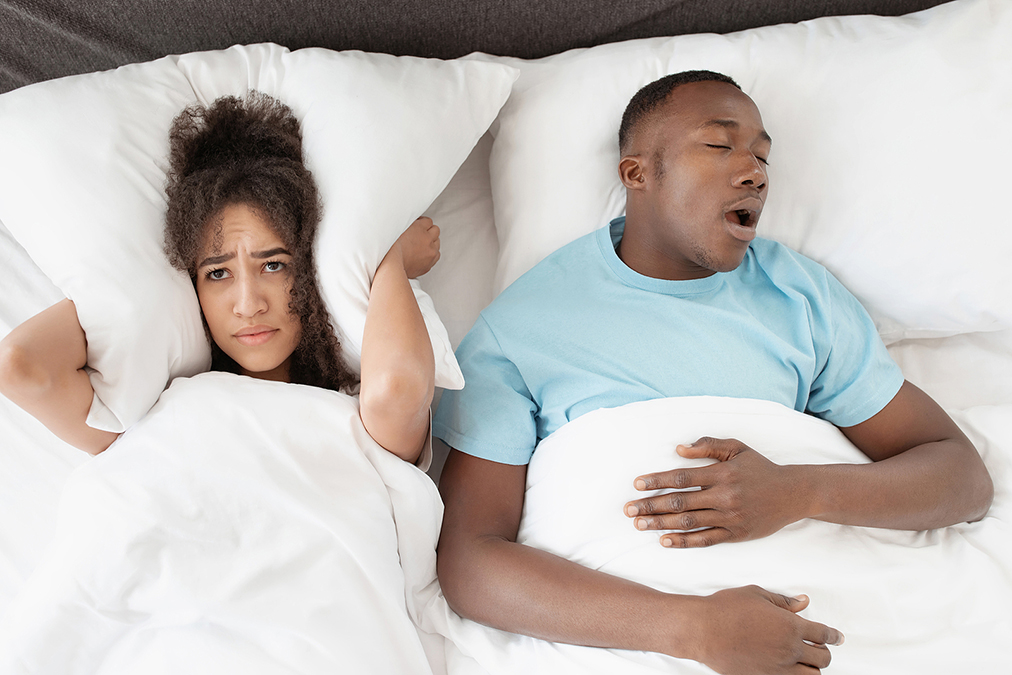 The list of terrifying side effects of sleep apnea is longer than we can post here. High blood pressure, heart attack, stroke, ED, and Alzheimer’s are just a few examples.
The list of terrifying side effects of sleep apnea is longer than we can post here. High blood pressure, heart attack, stroke, ED, and Alzheimer’s are just a few examples.
This is on top of drowsiness and lack of energy throughout the day.
The only medical treatment is continuous positive airway pressure (CPAP) but most people never get used to it and stop using it within weeks.
But a new study published in Curious reveals a great hope. Apparently, there are simple lifestyle changes you can make to completely rid yourself of sleep apnea for once and for all.
Researchers from the California Institute of Behavioral Neurosciences & Psychology and the Ragas Dental College in New Jersey started from the obvious assumption that our daily activities have an effect on our sleep quality at night.
They performed a review of the scientific literature to find out which parts of our lifestyles we could change to prevent sleep apnea or alternatively improve our symptoms.
The number one lifestyle intervention is weight loss. In fact, a 10 percent increase in weight increases our risk of sleep apnea sixfold. From the literature, they recommend physical exercise and a calorie-restricted diet to lose weight and keep it off. If needed, behavioral counseling with goal tracking and compliance checking can help.
The researchers found some studies that showed that weight loss had a far better success rate than CPAP at treating sleep apnea.
Fat is responsible for compromising your breathing and collapsing the walls of your airways in several ways. Fat around your neck and chest areas puts direct pressure on your airways. It damages the lining of your airways because of all the inflammation it causes.
Because of its disturbance of numerous hormones, fat interferes with your use of energy while you are asleep. Fat also causes conditions that have been linked with sleep apnea like high blood pressure and diabetes.
So, what can you do beyond physical exercise and calorie-restricted dieting?
-
1. Dieting. If a calorie-restricted diet sounds too depressing, the researchers found studies that concluded that those who made good dietary choices did not have to count calories to lose weight. These include fruit, vegetables, whole grains, and healthy proteins like beans and poultry. This also has to be accompanied by an avoidance of highly processed foods, refined grains, and sugar.
2. Smoking cessation. Nicotine relaxes your airway muscles and can cause them to collapse while you are asleep. It also causes inflammation in your upper airway.
3. Alcohol cessation. Alcohol also depresses your upper airway muscles. Moreover, it reduces arousal response time, which means that you wake up a lot more quickly if your breathing is not smooth.
4. Treat mood disorders. Depression and anxiety increase smoking and alcohol intake, and should therefore be addressed to treat sleep apnea.
5. Positional therapy. The old “tennis ball on the back” strategy to prevent you from rolling over during the night can cut down obstructed breathing, but compliance with this therapy is poor.
But the absolutely most effective way to treat both snoring and sleep apnea are simple throat exercises that open up your breathing passages so you don’t suffer those dreaded sleep apnea episodes—and they work even without weight loss.
You can learn these simple exercises to stop snoring and sleep apnea here…

 Overcoming IBD
Overcoming IBD Multiple Sclerosis
Multiple Sclerosis Banishing Bronchitis
Banishing Bronchitis Gum Disease Gone
Gum Disease Gone Overcoming Onychomycosis
Overcoming Onychomycosis Neuropathy No More
Neuropathy No More The Prostate Protocol
The Prostate Protocol Brain Booster
Brain Booster
 Ironbound
Ironbound
 Solution for Shingles
Solution for Shingles
 The Bone Density Solution
The Bone Density Solution
 The Ultimate Healing Protocol
The Ultimate Healing Protocol
 The Parkinson's Protocol
The Parkinson's Protocol
 The Chronic Kidney Disease Solution
The Chronic Kidney Disease Solution
 Overthrowing Anxiety
Overthrowing Anxiety The Fatty Liver Solution
The Fatty Liver Solution The Hypothyroidism Solution
The Hypothyroidism Solution
 The End of Gout
The End of Gout The Blood Pressure Program
The Blood Pressure Program
 The Oxigized Cholesterol Strategy
The Oxigized Cholesterol Strategy
 Stop Snoring And Sleep Apnea Program
Stop Snoring And Sleep Apnea Program
 The Arthritis Strategy
The Arthritis Strategy The Vertigo & Dizziness Program
The Vertigo & Dizziness Program The 3-Step Diabetes Strategy
The 3-Step Diabetes Strategy Hemorrhoids Healing Protocol
Hemorrhoids Healing Protocol The Erectile Dysfunction Master
The Erectile Dysfunction Master Weight Loss Breeze
Weight Loss Breeze The IBS Program
The IBS Program The Insomnia Program
The Insomnia Program The Migraine and Headache Program
The Migraine and Headache Program The Neck Pain Solution
The Neck Pain Solution The Menopause Solution
The Menopause Solution The Ejaculation Master
The Ejaculation Master The TMJ Solution
The TMJ Solution The Acid Reflux Solution
The Acid Reflux Solution The Fibromyalgia Solution
The Fibromyalgia Solution The Psoriasis Strategy
The Psoriasis Strategy